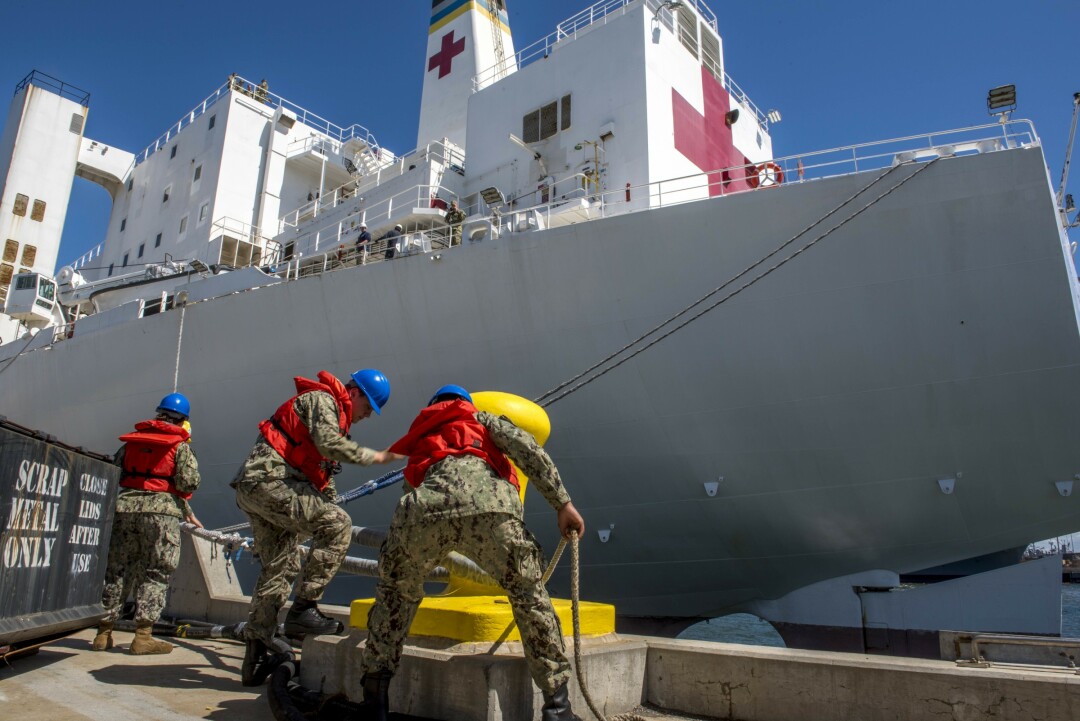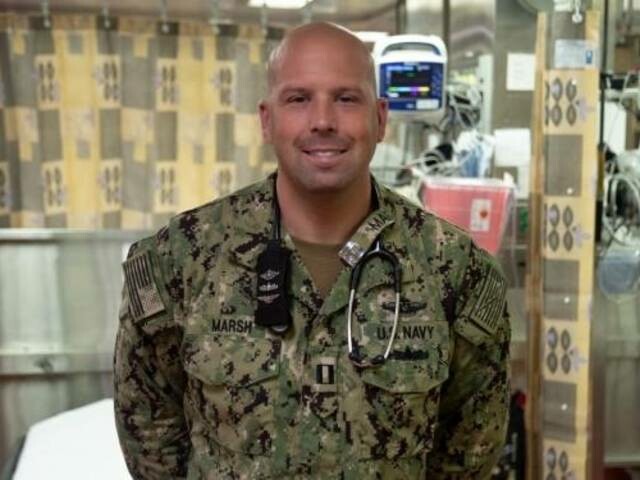MISSION OF MERCY: Blugold Grad Serving Aboard Floating Hospital in Los Angeles
UWEC alum, a Navy lieutenant, is part of COVID-19 relief efforts
Judy Berthiaume, UW-Eau Claire |

U.S. Navy Lt. Patrick Marsh, who graduated from UW-Eau Claire in 2014 with a degree in nursing, is an emergency room nurse on the hospital ship USNS Mercy, which has been docked at the Port of Los Angeles since the end of March.
Navy medical personnel – including Marsh – are treating non-COVID-19 patients onboard the hospital ship, allowing medical workers at Los Angeles area hospitals to focus exclusively on treating COVID patients. Treating non-COVID patients on Mercy also means the area’s on-land hospitals can dedicate their Intensive Care Units, ventilators, and other critical resources to COVID-19 patients.
“We are taking patient overflow so hospitals can focus on treating and saving COVID patients,” Marsh says, noting that treating non-COVID patients on the ship also will keep them separated from patients with the easily shared virus. “We’re here to take the burden off local hospitals.”
Ready to serve
There are 800 medical personnel and 70 support staff members on board the massive 1,000-bed hospital ship. The military’s medical team is prepared to provide a range of medical services including everything from general surgeries to critical care.
So far, Marsh says, those working on USNS Mercy are not seeing many patients, but numbers are expected to grow considerably as local hospitals reach their maximum capacity.
“I’m an emergency room nurse so I’m good at managing chaos; I don’t get too anxious about it,” U.S. Navy Lt. Patrick Marsh says of being a medical worker during a pandemic.
California already has nearly 28,000 reported cases of COVID-19, but public health experts predict the virus has not hit its peak in the state.
“Right now, we’re seeing about four patients a day,” Marsh said last week. “We’ve treated people for gunshot wounds, heart failure, and other things. We anticipate the numbers of patients we see will ramp up considerably as hospitals fill up with COVID patients.”
While he does not know exactly what the coming weeks will bring, Marsh is confident he is ready to handle whatever comes his way.
“I’m an emergency room nurse so I’m good at managing chaos; I don’t get too anxious about it,” Marsh says of being a medical worker during a pandemic.
Mercy’s home port is the Naval Base in San Diego, but Marsh expects that the ship will remain at the Port of Los Angeles for three to six months to support California’s COVID-19 relief efforts.
While he has provided medical care to people in other parts of the world during crises, this is the first time during his 16-year career in U.S. Navy that he is providing crisis care to people in the United States, Marsh says.
“I’m very happy to help,” Marsh says. “I’ve been in the military for 16 years, but I’ve always been deployed to foreign countries. This is first time we have been mobilized to come to the aid of our own country. It’s pretty cool that we are here to help.”

Finding a passion for health care and a career in the military
A native of the Chicago area, Marsh was a senior studying education in Minnesota when he realized that his passion was health care rather than teaching.
Instead of changing majors so late in his college career, Marsh left school without finishing his degree and enlisted in the U.S. Navy.
Given his interest in health care, he requested to be in the Navy’s medical division, Marsh says, adding that he was most interested in working in the area of emergency medicine.
Having grown up in a tough part of Chicago, Marsh saw enough trauma to know that he could handle an emergency medicine setting, he says.
“I saw a lot of stuff growing up, including seeing someone get shot on my first day of high school,” Marsh says. “I think I got a little desensitized to trauma because of what I saw growing up. But it also made me want to do something that would help people. I can’t think of a better way to help people than to be a medic.”
“I saw a lot of stuff growing up, including seeing someone get shot on my first day of high school,” Marsh says. “I think I got a little desensitized to trauma because of what I saw growing up. But it also made me want to do something that would help people. I can’t think of a better way to help people than to be a medic.”
About six years after he enlisted in the Navy, Marsh was named Sailor of the Year, an honor that put him on a new path within the military.
“The award basically means that they think they can’t pick a better candidate to be an officer than you so it pretty much guarantees you will get it if you put in for it,” Marsh says of moving to the officer track. “I put in for an officer program for nursing. They put me into the medical enlisting program, which meant that I could pick any university and the Navy would pay for me to go there and get a bachelor’s degree in nursing.”
As he considered his options, he ruled out nursing programs in the Chicago area because he worried there would be too many distractions so close to home.
He also eliminated colleges on the coasts because, as an avid surfer, he feared he also would be distracted there.
“I had taken the long route to nursing, so I wanted to go into college with a plan to make school a priority,” says Marsh, who was in his 30s when he began his nursing studies. “I knew I wanted to go someplace where I could focus on school 100 percent. I also wanted to be close enough to Chicago that I could visit, so I started looking at schools in the region.”
Becoming a Blugold
As he researched his college options, a friend told him to check out UW-Eau Claire’s nursing program.
One phone call convinced him that UW-Eau Claire was the right college for him, Marsh says.
Since he was stationed in Japan, the time difference meant he had to call in the middle of the night to reach someone in UW-Eau Claire’s nursing program.
“It was about 2am when I made the call,” Marsh says. “The person at UW-Eau Claire who answered was so helpful that I knew it was meant to be. I applied right away, was accepted, and started in the program that same year.”
His instincts about UW-Eau Claire being the best fit for him were right on, Marsh says.
“It was an amazing experience,” Marsh says of his time at UW-Eau Claire. “The program and the people were outstanding. The nursing staff and instructors made it an incredibly rewarding experience.
“It’s a special place because of the people. Everyone from the dean to all my instructors were so approachable. It was an awesome experience.”
“It’s a special place because of the people,” Marsh says of UW-Eau Claire.“Everyone from the dean to all my instructors were so approachable. It was an awesome experience.”
While his nursing classes were excellent, the opportunities that UW-Eau Claire offers nursing students outside the classroom also were extraordinary, Marsh says.
For example, as a UW-Eau Claire nursing student, he traveled to Texas and El Salvador for nursing clinicals.
“Those were really cool experiences and made the nursing program there even better,” Marsh says.
The Navy taught him how do to many things in the medical field and gave him experience working in emergency rooms and in intensive care units, Marsh says.
However, UW-Eau Claire helped him understand why he was doing those things and why he was doing them in a certain way, he says.
“UW-Eau Claire taught me not just the how but the why,” Marsh says. “Lightbulbs were constantly turning on in my head because suddenly so many things made sense.
“In the military, I was focusing on tasks. UW-Eau Claire helped me understand the why and how to help patients. They helped me understand the purpose behind what we were doing, and that was really important to me.”
Still on active duty throughout his studies at UW-Eau Claire, Marsh became a commissioned officer in the U.S. Navy during a ceremony that immediately followed the university’s commencement ceremony.
It meant a lot, he says, to be commissioned in front of the newly graduated nursing students whom he’d worked and studied alongside and the nursing faculty, staff, and administrators who had taught and supported him.
Building his knowledge, military career
Since receiving his bachelor’s degree from UW-Eau Claire in 2014, Marsh already has earned three master’s degrees.
It’s rewarding, he says, to continue his education so he can grow in his career as a medic.
“When I went to UW-Eau Claire, I was worried about being good in my job and good in school,” Marsh says. “I took both very seriously then and still take them seriously now. The Navy looks at how you perform and will continue to pay for school as long as you continue to perform well.”
For now, Marsh says he is glad to have the opportunity to put all his medical training and experiences to use to support California’s COVID-19 relief efforts.
“I’m happy to be in LA to help and ready to show everyone what a Navy medic can do,” Marsh says.
Judy A. Berthiaume is a senior editor with the Integrated Marketing and Communications office at UW-Eau Claire.






















